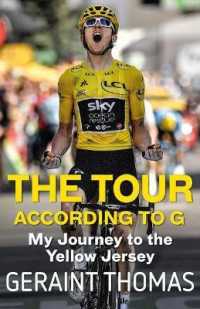- ホーム
- > 洋書
- > 英文書
- > Computer / General
基本説明
Edited by B. J. Copeland. Turing, pioneer of computing and WWII codebreaker, was one of the most influential thinkers of the twentieth century. His key writings are made available for the first timme. Publication delayed from 2003.
Full Description
Alan Turing, pioneer of computing and WWII codebreaker, is one of the most important and influential thinkers of the twentieth century. In this volume for the first time his key writings are made available to a broad, non-specialist readership. They make fascinating reading both in their own right and for their historic significance: contemporary computational theory, cognitive science, artificial intelligence, and artificial life all spring from this ground-breaking work, which is also rich in philosophical and logical insight. An introduction by leading Turing expert Jack Copeland provides the background and guides the reader through the selection.
About Alan Turing
Alan Turing FRS OBE, (1912-1954) studied mathematics at King's College, Cambridge. He was elected a Fellow of King's in March 1935, at the age of only 22. In the same year he invented the abstract computing machines - now known simply as Turing machines - on which all subsequent stored-program digital computers are modelled.
During 1936-1938 Turing continued his studies, now at Princeton University. He completed a PhD in mathematical logic, analysing the notion of 'intuition' in mathematics and introducing the idea of oracular computation, now fundamental in mathematical recursion theory. An 'oracle' is an abstract device able to solve mathematical problems too difficult for the universal Turing machine.
In the summer of 1938 Turing returned to his Fellowship at King's. When WWII started in 1939 he joined the wartime headquarters of the Government Code and Cypher School (GC&CS) at Bletchley Park, Buckinghamshire. Building on earlier work by Polish cryptanalysts, Turing contributed crucially to the design of electro-mechanical machines ('bombes') used to decipher Enigma, the code by means of which the German armed forces sought to protect their radio communications. Turing's work on the version of Enigma used by the German navy was vital to the battle for supremacy in the North Atlantic. He also contributed to the attack on the cyphers known as 'Fish'. Based on binary teleprinter code, Fish was used during the latter part of the war in preference to morse-based Enigma for the encryption of high-level signals, for example messages from Hitler and other members of the German High Command. It is estimated that the work of GC&CS shortened the war in Europe by at least two years. Turing received the Order of the British Empire for the part he played.
In 1945, the war over, Turing was recruited to the National Physical Laboratory (NPL) in London, his brief to design and develop an electronic computer - a concrete form of the universal Turing machine. Turing's report setting out his design for the Automatic Computing Engine (ACE) was the first relatively complete specification of an electronic stored-program general-purpose digital computer. Delays beyond Turing's control resulted in NPL's losing the race to build the world's first working electronic stored-program digital computer - an honour that went to the Royal Society Computing Machine Laboratory at Manchester University, in June 1948. Discouraged by the delays at NPL, Turing took up the Deputy Directorship of the Royal Society Computing Machine Laboratory in that year.
Turing was a founding father of modern cognitive science and a leading early exponent of the hypothesis that the human brain is in large part a digital computing machine, theorising that the cortex at birth is an 'unorganised machine' which through 'training' becomes organised 'into a universal machine or something like it'. He also pioneered Artificial Intelligence.
Turing spent the rest of his short career at Manchester University, being appointed to a specially created Readership in the Theory of Computing in May 1953. He was elected a Fellow of the Royal Society of London in March 1951 (a high honour).
Contents
Alan Turing 1912-1954 ; Computable Numbers: A Guide ; 1. On Computable Numbers, with an Application to the Entscheidensproblem (1936) ; 2. On Computable Numbers: Corrections and Critiques ; 3. Systems of Logic Based on Ordinals (1938) ; 4. Letters on Logic to Max Newman (c. 1940) ; Enigma ; 5. History of Hut 8 to December 1941 (1845) ; 6. Bombe and Spider (1940) ; 7. Letter to Winston Churchill (1941) ; 8. Memorandum to OP-20-G on Naval Enigma (c. 1941) ; Artificial Intelligence ; 9. Lecture on the Automatic Computing Machine (1947) ; 10. Intelligent Machinery (1948) ; 11. Computing Machinery and Intelligence (1950) ; 12. Intelligent Machinery, A Heretical Theory (c. 1951) ; 13. Can Digital Computers Think? ; 14. Can Automatic Calculating Machines Be Said to Think? (1952) ; Artificial Life ; 15. The Chemical Basis of Morphogenesis (1952) ; 16. Chess (1953) ; 17. Solvable and Unsolvable Problems (1954)






